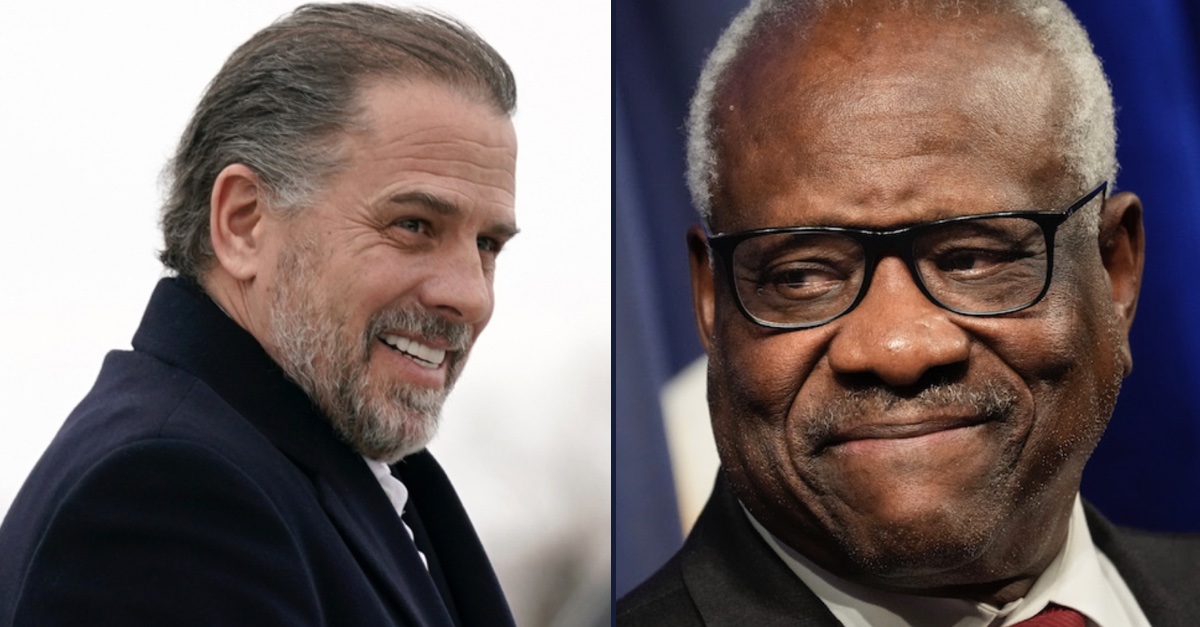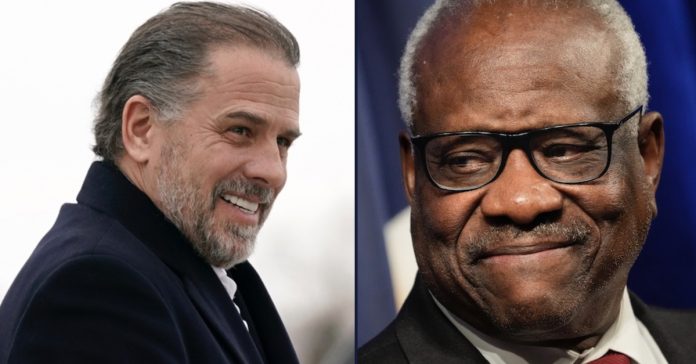
Hunter Biden pictured on Feb. 4, 2023 (AP Photo/Patrick Semansky), Justice Clarence Thomas speaks on Oct. 21, 2021 (Photo by Drew Angerer/Getty Images)
Criminal defense lawyers for President Joe Biden’s son Hunter Biden filed motions to dismiss his federal gun indictment in Delaware on multiple different grounds on Monday, arguing in one motion that special counsel David Weiss failed to bring a “constitutionally permissible” charge in light of the conservative majority’s major Second Amendment ruling in New York State Rifle & Pistol Association, Inc. v. Bruen.
That June 2022 opinion in Bruen was penned by Justice Clarence Thomas. While Thomas was joined by each of the conservative justices on the court, then-Justice Stephen Breyer, Justice Sonia Sotomayor, and Justice Elena Kagan dissented.
After a plea deal fell apart over the summer, Hunter Biden was indicted in September on three charges that he now argues should all be dismissed.
The first count alleged that Biden “knowingly made a false and fictitious written statement, intended and likely to deceive” a gun company to obtain a Colt Cobra 38SPL revolver that he “was not an unlawful user of, and addicted to, any stimulant, narcotic drug, and any other controlled substance, when in fact, as he knew, that statement was false an fictitious.” The second count alleged that Biden falsely “certified” to the ATF on “Form 4473” that he was not an unlawful user of or addicted to drugs.
The third count charged that Biden illegally possessed the Colt Cobra 38SPL revolver from Oct. 12, 2018 to Oct. 23, 2018 — for 11 days — while “knowing” that he was an unlawful user of or addicted to drugs. The defendant asserted that the third count, charged under 18 U.S. Code § 922(g)(3), doesn’t pass constitutional muster and, because of that, the first and second counts should be thrown out, too.
“The prosecution charges that Mr. Biden violated a rarely used statute that it claims prevented him from owning a firearm as an unlawful user of a controlled substance, 18 U.S.C. § 922(g)(3), but that statute’s status-based prohibition on gun ownership recently was struck down as unconstitutional under the Second Amendment. See United States v. Daniels, 77 F.4th 337 (5th Cir. 2023),” the motion said. “Not only does the unconstitutionality of Section 922(g)(3) render Mr. Biden’s alleged violation of that unconstitutional statute baseless, it compels the same conclusion as to the prosecution’s charges that Mr. Biden made a false statement in denying his status as a user of a controlled substance under 18 U.S.C. § 922(a)(6) and caused the seller (a holder of a federal firearms license) to maintain a record of this false answer in violation of 18 U.S.C. § 924(a)(1)(A).”
In support of his argument, Biden looked to the conservative justices’ Second Amendment jurisprudence to argue that the statute is out of step “with this nation’s historical tradition on firearm regulation.”
“Gun control is a politically charged topic, and the scope of permissible gun control laws consistent with the Second Amendment has been a divisive legal issue among scholars, but the Supreme Court in New York State Rifle & Pistol Association v. Bruen, 142 S. Ct. 2111 (2022), recently adopted a test for evaluating the constitutionality of restrictions on the possession of firearms that resolve many of those issues,” the motion said. “The Supreme Court held that an individual’s right to possess a handgun is ‘presumptively’ protected by the Second Amendment.”
Biden’s lawyers noted that the conservative U.S. Court of Appeals for the Fifth Circuit in U.S. v. Daniels “[j]ust recently […] applied the new Bruen framework to Section 922(g)(3)’s prohibition on gun ownership by persons who is a user of or addicted to controlled substances, the same statute at issue in Mr. Biden’s case, and it had no difficulty finding the statute unconstitutional.”
Saying the challenged “statute is indefensible under the Bruen framework,” Biden reiterated that “there is no historical precedent for prohibiting gun ownership by persons who had any history of ingesting intoxicating substances.”
“Rather,” the motion said, “the problems associated with intoxication were addressed by prohibiting certain conduct while intoxicated.”
The defense summed up the argument this way:
While Congress could criminalize gun possession from someone who was actively intoxicated, or perhaps someone who at least actively had a controlled substance in their body, a prohibition on gun ownership by anyone who had at some time used a controlled substance is constitutionally overbroad under Bruen.
In a footnote, the defense gamed out an “absurd” scenario where anyone in America who has used in marijuana in the past could theoretically be prosecuted as a felon when later possessing a firearm.
“Even before Bruen, this statute was rarely used to charge anyone, particularly absent other more serious charges, because it would be absurd to apply it literally,” the footnote said. “Roughly half of American adults, for example, have tried marijuana, and there would be a staggering number of felons in the United States if all those who did later come into possession of a firearm were prosecuted under Section 922(g)(3).”
Hunter Biden separately asserted that indictment should be dismissed for selective/vindictive prosecution and breaching the separation of powers. He also maintained that the since-scuttled plea agreement to tax misdemeanors still renders him immune from being prosecuted in the gun case.
“The Indictment against Mr. Biden must be dismissed because it violates a Diversion Agreement that is in effect between Mr. Biden and the prosecution,” the motion said. “In exchange for Mr. Biden giving up various rights — including his Fifth Amendment right to remain silent by agreeing to the Statement of Facts drafted by the prosecution and numerous restrictions on his liberty — the prosecution agreed to provide him immunity for any offense concerning his purchase of a firearm (among other offenses).”
In addition to the above, Hunter Biden’s lawyers Abbe Lowell and Bartholomew Dalton asked U.S. District Judge Maryellen Noreika to set an evidentiary hearing on the motions to dismiss.
Have a tip we should know? [email protected]

